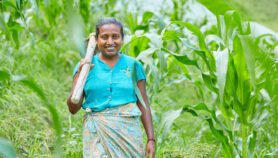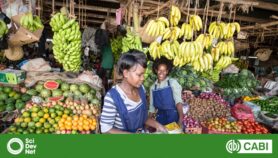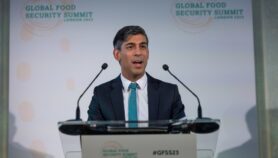By: Catarina Chagas
Send to a friend
The details you provide on this page will not be used to send unsolicited email, and will not be sold to a 3rd party. See privacy policy.
[RIO DE JANEIRO] Brazil’s agriculture could be severely affected by climate change, with soya hardest hit by rising temperatures, report Brazilian scientists.
They based their projections on climate models developed by the UK Met Office’s Hadley Centre for Climate Prediction and Research.
The researchers considered two possible scenarios for the future: an optimistic one, with a 1.4–3.8 degrees Celsius temperature rise by 2100, and a pessimistic one, with a rise from 2–5.4 degrees Celsius.
They modelled the impact of such temperatures on agricultural land and their effect on Brazil’s nine most important crops — cotton, rice, coffee, sugar cane, beans, sunflower, cassava, maize and soya.
Under the most optimistic scenario, by 2020, six of Brazil’s food crops — rice, coffee, beans, cassava, maize and soya — could have dropped in value by a total of 6.7 billion Brazilian reals (US$4 billion).
The rise in temperature will increase the loss of water through evaporation from soil and plant transpiration, reducing crop-growing areas particularly in northeast Brazil.
Soya will be the most threatened, with land suitable for soya cultivation predicted to drop by about 20 per cent by 2020 and 40 per cent by 2070, even under the optimistic scenario.
But sugar cane cultivation could double in a few decades because of the crops’ ability to adapt to higher temperatures and increases in carbon dioxide.
"Sugar cane plantations will benefit with future scenarios, increasing ethanol production. However, essential crops for the internal market and population nutrition will suffer, bringing a high social cost," Hilton Silveira Pinto, one of the report’s authors and a senior researcher at the State University of Campinas (Unicamp), told SciDev.Net.
He adds that the most pessimistic scenario will only be realised if there are no efforts to mitigate climate change and minimise the impact of rising temperatures by modifying production techniques.
Suggestions to minimise impacts include better use of soil by alternating grazing and planting land, encouraging the production of crop varieties adapted to drought and genetic improvement of plants.
The report was released this month (11 August) by the Unicamp, the Brazilian Agricultural Research Corporation, and the Center for Weather Prediction and Climate Studies.
The researchers will now analyse the impact of global warming on other crops and livestock, and social impacts from the change in agriculture. A new report will be released in 2009.













